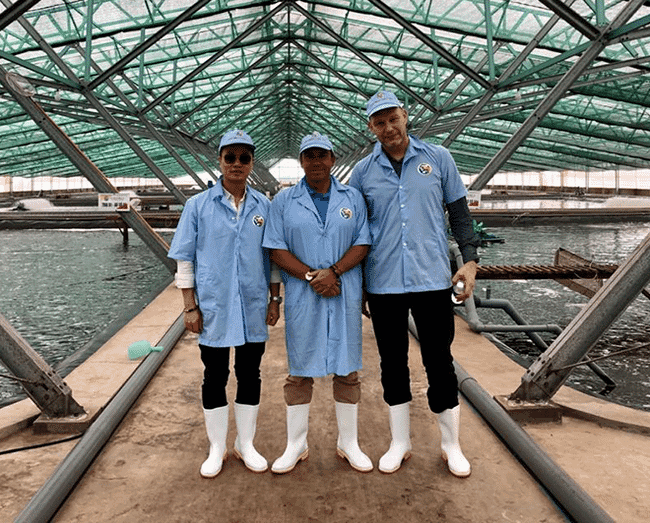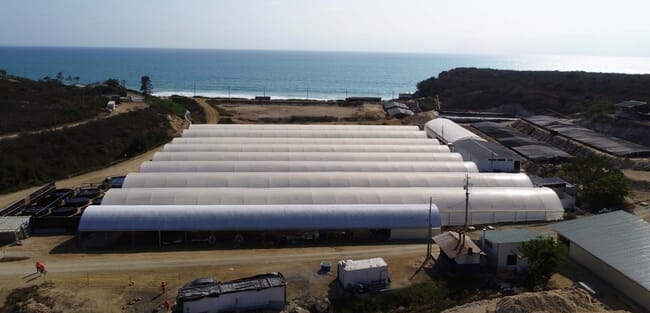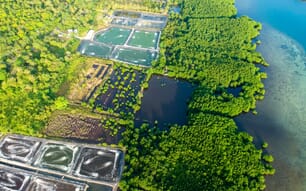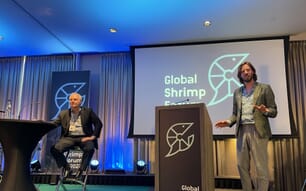
Gammelgaard will be among the speakers at the M&A session © BioMar
It’s a topic that Rabobank’s senior seafood analyst will be giving plenty of thought to in the weeks leading up to September’s Global Shrimp Forum, where he will be chairing a morning session on the subject.
“Because shrimp farming is a young industry and has a large component in developing countries it’s still very fragmented, but is an phase where consolidation is accelerating. As interest rates come down it’s easier to pay for companies and I think the sector is ripe for many more deals. The sector is still immature and there’s still a lot of volatility, but now you’re starting to have bigger companies, bigger scale, interest from bigger players – already some parts of the value chain are becoming consolidated, like the feed sector in Ecuador,” he reflects.
“In general, farming is always fragmented. Even in beef and poultry you still have independent farmers – so does it make sense to have a Mowi of shrimp, who’s farming in multiple locations? Maybe it makes sense in some regions – for example, a producer in Latin America with operations in Peru, Ecuador and Mexico which are culturally more similar?” he adds.
The different sides to consolidation
It’s a topic Nikolik will be discussing with a panel of top executives from across the value chain. These will include Michael Gammelgaard, business development director at BioMar – which has bought feed producers in Ecuador and Vietnam and started a joint feed venture in China. Gammelgaard is expected to discuss not just feed, but also the logic behind operating in different parts of the value chain, since BioMar has recently acquired an Australian tech company, AQ1 and invested in a shrimp hatchery run by Viet Uc, in Vietnam.
Sandro Coglitore, general manager of Omarsa, which is now one of the largest shrimp producers in the world, will discuss consolidation in the farming side.
“Does shrimp farming benefit from being on a larger scale, what are the drawbacks and is there logic in international expansion or more vertical integration?” Nikolik wonders.
David Danson, managing director of Hendrix Genetics' shrimp business will talk about M&As in shrimp genetics and what can the industry learn from other species, in the light of the company's decision to diversify from poultry and livestock into aquaculture, by acquiring companies such as Troutlodge, Landcatch and Moana.

© Hendrix Genetics
Meanwhile Utham Gowda, CEO and founder of Captain Fresh, will discuss the processing side, not least his recent acquisition of US processor CenSea and his “plans to reinvent the value chain” – a move that has caused quite a stir in the sector.
“Each will discuss the benefits and challenges of inorganic growth. The benefits could be scale economics, having better access to capital and new technology, and reaching new markets. But, on the other hand, some of the biggest bankruptcies we’ve ever seen in the seafood industry are when companies have been very aggressive with their acquisitions, but have ended up overpaying or have failed to achieve synergies, due to factors such as cultural and contractual problems,” notes Nikolik.
“I want all four of the speakers to describe their personal experiences of M&A – the challenges, and the strategy going forward,” he adds.
An investor’s perspective
The discussion will also include input from seafood investors, including Reinier Henneman, global head farm inputs at Rabobank Finance.
“The aim is to talk about how the investment community views the shrimp sector. Is the shrimp value chain an opportunity? What are the key considerations? How is deal valuation affected by changes in interest rates?” Nikolik considers.
Other topics to discuss include how global politics, such as the rivalry of China and the US, is impacting the industry from an M&A perspective.
“Will growing protectionism and nationalism impact M&A in agriculture and also the shrimp value chain?” Nikolik asks.






